

Orphanages not best refuge for children. Prevalence, incidence and chronicity of child abuse among orphaned, separated, and street-connected children and adolescents in western Kenya: What is the impact of care environment? Abebe and Aase, 2007 T.
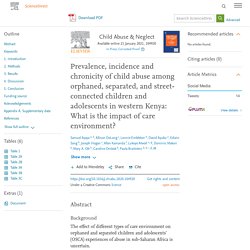
Abebe, A. More than 21,000 children removed from Kenyan orphanages. The stranded babies of Kyiv and the women who give birth for money. Some are crying in their cots; others are being cradled or bottle-fed by nannies.
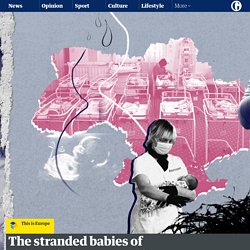
These newborns are not in the nursery of a maternity hospital, they are lined up side by side in two large reception rooms of the improbably named Hotel Venice on the outskirts of Kyiv, protected by outer walls and barbed wire. They are the children of foreign couples born to Ukrainian surrogate mothers at the Kyiv-based BioTexCom Centre for Human Reproduction, the largest surrogacy clinic in the world.
They’re stranded in the hotel because their biological parents have not been able to travel in or out of Ukraine since borders closed in March because of the Covid-19 pandemic. Anxious parents check on the children they have not yet met via video calls, and others have sent audio recordings of their voices to soothe the children. BioTexCom released video footage from the hotel in mid-May to highlight the heartbreaking dilemma for parents and to lobby for an easing of border closures.
Surrogacy for foreigners should be banned in Ukraine, - official - Ukraine should ban surrogacy for foreigners, - official - 112.international. The Commissioner of the President of Ukraine for Children's Rights Mykola Kuleba Mykola Kuleba, the Commissioner of the President of Ukraine for Children's Rights, said that foreigners should be banned from using surrogacy services.
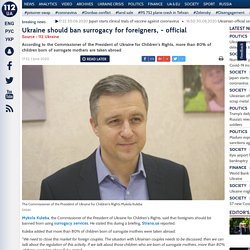
He stated this during a briefing, Strana.ua reported. Kuleba added that more than 80% of children born of surrogate mothers were taken abroad. "We need to close this market for foreign couples. Hard times push parents to give up children. By NICHOLAS KOMU By JAMES MURIMI "I am going through agony.
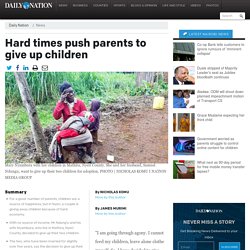
Why are Africa's coronavirus successes being overlooked? Emember, early on in the Covid-19 pandemic, the speculation as to how apocalyptic it would be if this disease hit the African continent?

I do. There was deep anxiety about what it would mean for countries with lower income populations, dominant but harder-to-regulate informal economies and far fewer healthcare facilities than the UK or Italy. There have been coronavirus mistakes and misjudgments, and deaths, and each one is a tragedy. And no one knows the course the pandemic may take next – the continent, like the rest of the world, isn’t out of the woods yet. But what has also happened is that many African nations, realising early on that large-scale, expensive testing and hospitalisation was not an option for the populations, had no choice but to take a more creative approach.
Responding to crisis with digital payments for social protection: Short-term measures with long-term benefits. Government-to-person (G2P) payments have never been more important, as governments worldwide seek for ways to respond to the economic and social consequences of the COVID-19 pandemic.
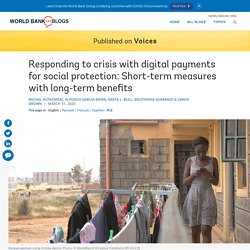
Eighty-four countries have reported changes to their social protection systems in response to the pandemic; fifty-eight countries of these are scaling up cash transfer schemes. During this current crisis, many governments are considering direct financial transfers to households and small businesses as well, outside of traditional social protection mechanisms. In many developing countries, the scale of these payments is unprecedented; in Argentina, Pakistan and Peru, new programs cover one third of their populations; in the Philippines, more than 70 percent of households will receive emergency transfers.
For the 656 million people worldwide living in extreme poverty, immediate cash support can be lifesaving. Countries with advanced G2P payment ecosystems are able to push transfers out with lightning speed. Children in detention are at heightened risk of contracting COVID-19 and should be released. NEW YORK, 13 April 2020 – “Hundreds of thousands of children currently detained in countries around the world are at grave risk of contracting COVID-19.
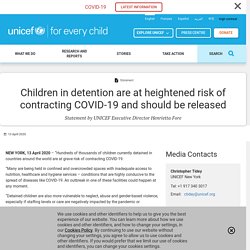
“Many are being held in confined and overcrowded spaces with inadequate access to nutrition, healthcare and hygiene services – conditions that are highly conducive to the spread of diseases like COVID-19. An outbreak in one of these facilities could happen at any moment. “Detained children are also more vulnerable to neglect, abuse and gender-based violence, especially if staffing levels or care are negatively impacted by the pandemic or containment measures. Protection - UNHCR Kenya. The protection delivery unit (PDU) in UNHCR Kenya delivers a whole range of protection services to persons of concern.
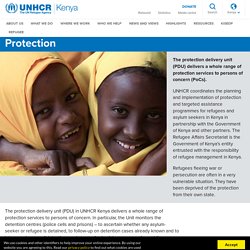
In particular, the Unit monitors the detention centres (police cells and prisons) – to ascertain whether any asylum-seeker or refugee is detained, to follow-up on detention cases already known and to intervene in case of detention on charges of unlawful presence or for residing outside the refugee camps. PDU also monitor the external borders of Kenya to make sure that asylum-seekers have effective access to the Kenyan territory and that they are not refouled to their country of origin or to another country where their security and life could be at risk. WOMEN FOSTERING CHILDREN AT DADAAB CAMP. By Delfhin Mugo Without parents, unaccompanied and abandoned child refugees are finding love in foster parents, themselves refugees.
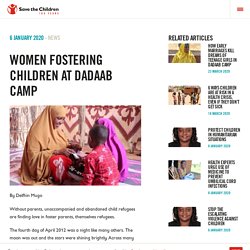
The fourth day of April 2012 was a night like many others. The moon was out and the stars were shining brightly. Across many makeshift shelters in the Ifo Camp, one of the three that make the Dadaab Refugee Camp, the 9pm news bulletin was broadcasting on radio. Ms Rahmo Abdullahi was seated in her kitchen, listening to news in Somali language while preparing super for her seven children. It began with the sound of a car pulling over, which was strange because cars are not allowed into the camp beyond certain hours. Within seconds, wildcats ran towards the package and started clawing away at it. At a nearby health facility, where Ms Abdullahi rushed the newborn for a check-up, she learnt that were it not for her swift action, the baby would have died; the placenta was still dangling freely from the baby’s belly.
“She is my only source of joy. John's Closing Speech: MUNISH. Outcry over 'saviour complex' fuelling exploitation of Kenyan children. Campaigners trying to fight the exploitation of children in Kenyan orphanages say they are being undermined by a “white saviour” complex among churches and other charitable groups.
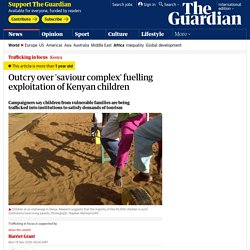
The use of orphanages as “tourist attractions” in places like Mombasa is unethical and fuelling trafficking, child support organisations say. Traffickers are feeding a market in children, supported by tourists’ desire to visit institutions in places like Mombasa, said Michelle Oliel of the Stahili foundation, which combats child exploitation in Kenya. “Orphanages are sites of trafficking and that was recently recognised in the US Trafficking in Persons report.
There is now growing awareness of the fact that orphanages are damaging. [But] with cheaper air fares there is a proliferation of orphanages in tourist destinations. Oliel said: “I went to visit one orphanage as part of our work on ending the institutionalisation of children. It sometimes means they have to turn down offers of money, she said. Kenya takes next steps to replace children's homes with family care. Kenya has taken significant steps to place family-based care at the centre of its child protection system. This is a break from the decades-old practice of privately-run institutions providing institutional care for disadvantaged children. These institutions largely fed off the effects of poverty, lack of access to services and education, disability and family breakdown. There are still an estimated 40,000 children in 830 children’s homes across Kenya. Most are privately-run.
Comprehensive information on the actual number of institutions and children living in them is unavailable. Research has shown that institutional care is inherently harmful to a child’s development and well-being. Calls mount to stop orphanages exploiting poor children to lure money, tourists. Children homes in crisis as Covid-19 dries up donations. By ANITA CHEPKOECHMore by this Author Children homes across the country have been thrown into a crisis following the lockdown over coronavirus, hindering their access to donations. The government’s directive to shut all churches and organisations that offer non-essential services has further deemed hopes of the children’s homes and homes of the elderly, which majorly rely on well-wishers and faith-based institutions to operate. Kenya takes next steps to replace children's homes with family care. Government finally acts to protect Kenyan children – Nairobi News. For the longest time in Kenya, the media has been awash with stories of abuse of children, whether at home, school and increasingly in charitable institutes, commonly known as homes.
Fresh in the mind of Kenyans is the #PreyingMissionaries documentary on NTV, which detailed the harrowing story of Gregory Dow, a missionary who abused children he purported to care for at a home in Boito, Bomet County. But in all this, the government has been loudly silent on the many abuse cases against the most vulnerable minors. Apart from knee jerk reactions to the occasional story in the media, with promises of investigations, nothing more has transpired in actively protecting children.
However, since the airing of the #PreyingMissionaries, the Directorate of Criminal Investigations, led by George Kinoti, seems determined to fight for the Kenyan children.